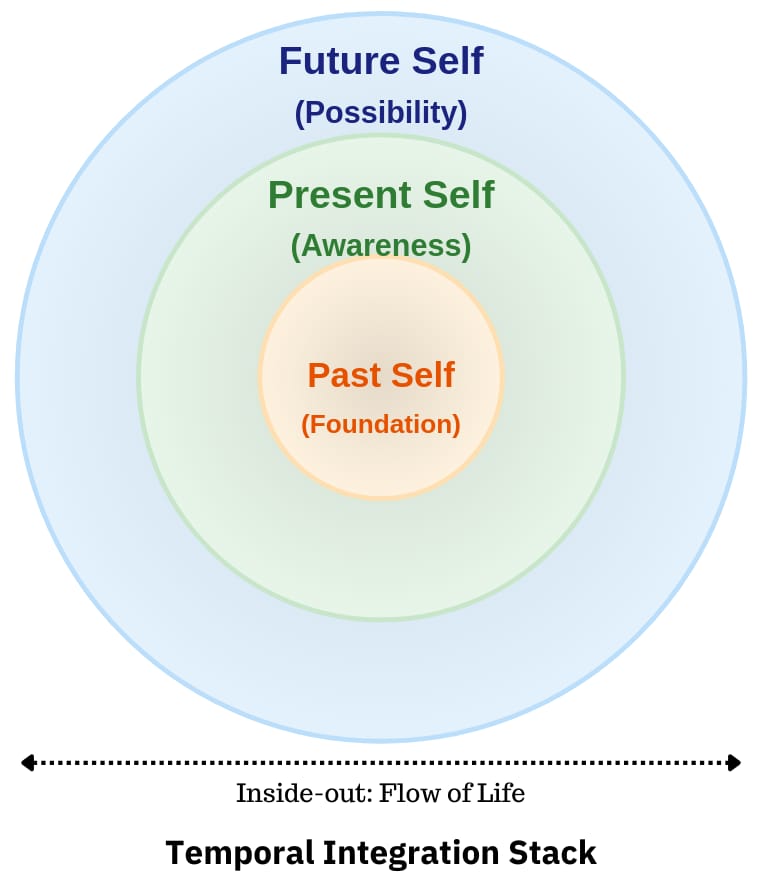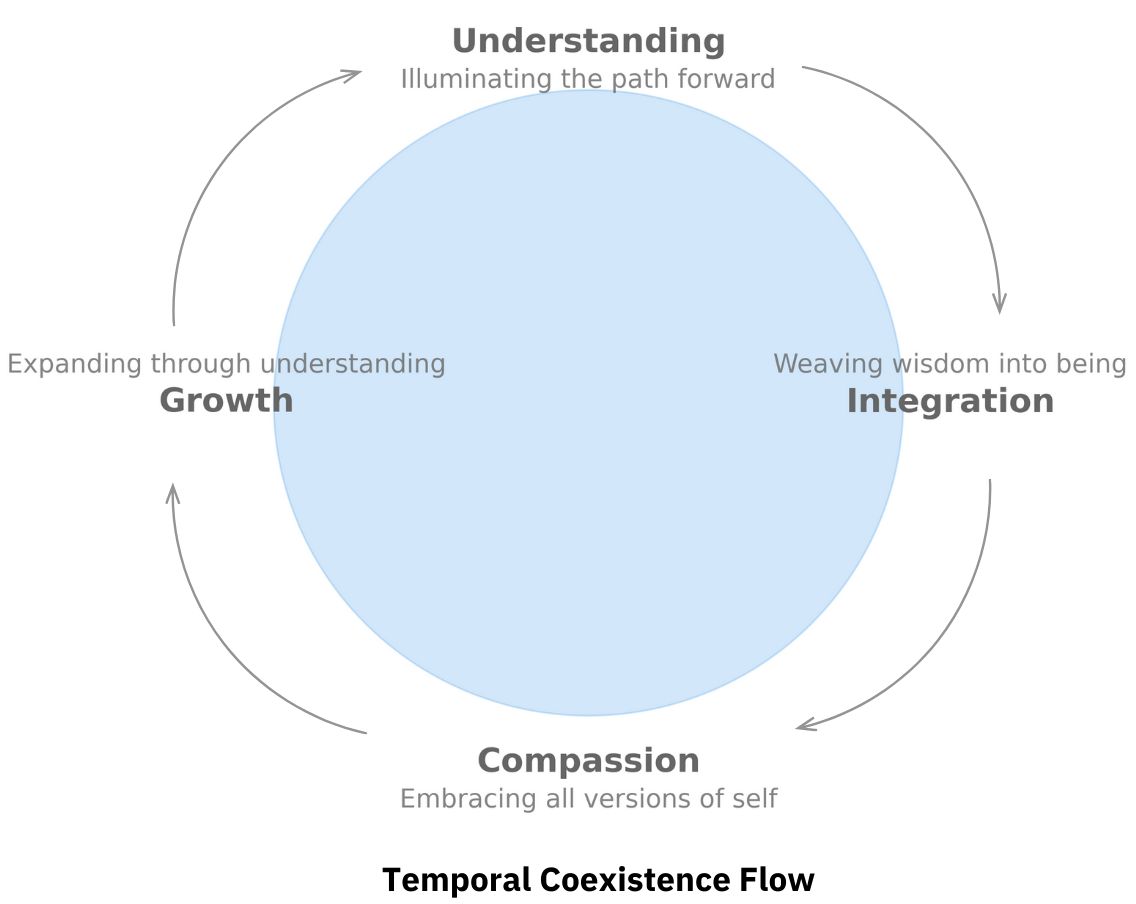Ever noticed how growth makes time travel dangerous?
The promotion you just earned suddenly illuminates every wrong career move. The relationship you've mastered makes your past heartbreaks seem foolish. The wisdom you've gained transforms your previous decisions into mistakes.
Isn't it strange?
The better you become, the harder it gets to live with who you were.
This isn't just happening to you. It's the hidden tax of growth that nobody talks about - the way evolution turns wisdom into a weapon against our past selves.
But what if I told you this curse is actually a doorway? 🚪✨

Gif by therighteousgemstones on Giphy
KEY INSIGHTS ⭐️
Your harshest judgments often come from your greatest growth 📈
The past isn't meant to be fixed—it's meant to be understood 🧠
Time doesn't heal all wounds—understanding does ⏳
Freedom isn't found in changing history, but in changing your relationship with it 🔓
Last night, I found myself staring at an old photograph. 📸
You know those moments when time seems to fold in on itself? When your present self gazes back at a version of you that feels simultaneously familiar and foreign?
I was holding a picture from about ten years ago. Same face, different eyes. Same smile, different story.
And in that moment, something profound hit me:
We've mastered the art of learning from our past, but we're absolute beginners at living with it.
Time is not a line but a dimension, like the dimensions of space.
📝 Reflection: The Professional Mirror: Take a moment, consider:
When was the last time your professional growth made you question your past decisions? What wisdom do you have now that makes past choices seem unclear? Notice how your current expertise casts shadows on your journey.
THE SHADOW OF GROWTH 🌓
Here's a crucial fact that remains unnoticed by most of us: The more you evolve, the more your past can haunt you.
It's a peculiar paradox, isn't it? Your growth—the very thing that should free you—often becomes the lens through which you torture yourself.
Picture this: You're mentoring three people:
👩🎓 A teenager struggling with time management, checking social media every five minutes while trying to study - just like you did at that age. 📱
👨💼 A junior team member taking on too many projects to prove their worth - exactly as you did in your early career. 📊
🌍 A tourist getting embarrassingly excited about landmarks you now consider ordinary - mirroring your own first visits to new cities. 🌆
Would you berate them for their current stage of growth? Mock their learning process? Shame their evolving perspective?
Of course not.
Yet this is precisely how we treat our past selves.

Giphy
We are not nouns, we are verbs. I am not a thing - an actor, a writer - I am a person who does things - I write, I act - and I never know what I'm going to do next. I think you can be imprisoned if you think of yourself as a noun.
THE GEOMETRY OF GROWTH 📈
Look at this image carefully.
What you're seeing isn't just a graph. It's the mathematics of self-judgment. The architecture of growth. The blueprint of wisdom.

That orange arrow on the graph? ↗ That's where the magic…and the mayhem…happens.
We call it the Judgment Gap: the precise distance between who you were when you made a decision, and who you've become while judging it.
Notice three critical elements:
The Past Decision Point
Where you stood, with the tools you had, making the best choice you could make.
The Present Understanding
Where you are now, equipped with wisdom that didn't exist when you made that choice.
The Judgement Gap Itself
Not just a measure of time, but a record of transformation. Every skill you've gained, every lesson you've learned, every insight you've earned, lives in that space.
Here's the revelation: The wider this gap grows, the more wisdom you've gained. But also? The harder it becomes to remember that your past self couldn't access what makes your present judgment possible.
This is the calculus of compassion. The geometry of growth. The mathematics of mercy.
THE TIME TRAVEL FALLACY 🎭
Last week, during a particularly intense conversation, my friend Joy (name changed) almost broke down discussing a business decision he made in 2018. "I should have known better," he kept saying.
Should he have, though? 🤔
Let's do an exercise together:
Think of your most painful "I should have known better" moment. Now, let's time travel accurately:
What information didn't you have then? 📜
What skills hadn't you developed yet? 🛠️
What awareness hadn't you cultivated? 🧩
The past isn't just a different time—it's a different reality, inhabited by a different you.
📝 Reflection: The Spiritual-Professional Paradox: Pause here. Consider deeply:
In your professional journey, where has your greatest "failure" led to the most profound spiritual growth? What business setback became a gateway to deeper understanding? Notice how professional evolution often catalyses spiritual awakening.
THE NEUROSCIENCE OF TEMPORAL INTEGRATION 🧠
Here's what neuroscience tells us about the nature of memory:
Your memories aren't recordings—they're reconstructions.
Every time you recall a past event, your brain doesn't just press play. It opens the file for editing. This process, known as memory reconsolidation, transforms each remembrance into an opportunity for rewriting.

Gif by palerlotus on Giphy
Dr. Karim Nader's groundbreaking research at McGill University revealed something stunning: when memories surface, they temporarily become unstable. Malleable. Open to revision.
Think about that for a moment.
Every time you judge your past self, you're not actually seeing them as they were. You're seeing them through a lens that didn't exist then—a lens crafted by every experience you've had since.
This isn't just fascinating neuroscience. It's a doorway to freedom.
TEMPORAL INTEGRATION STACK 📚
During a recent NLP training, I encountered a fascinating insight about temporal judgment. People often say, "If I could go back, I'd do things differently." But this statement contains a hidden fallacy—we imagine returning with our current wisdom while conveniently forgetting that this wisdom was forged in the very experiences we wish to change.
It's like wanting to edit the first chapter of a book while keeping the character development from the entire story. The mathematics of growth simply doesn't work that way.

This is why growth can feel like a burden. Each new level of awareness doesn't just expand your future possibilities—it also recontextualises your entire history.
But here's where it gets interesting:
Understanding this mechanism doesn't just provide relief - it offers a framework for liberation.
THE TEMPORAL COEXISTENCE PROTOCOL 🛠️
Here's how to transform your relationship with your past:
1. Practice Temporal Accuracy 🕰️
Document your former context
List your actual limitations
Acknowledge your real constraints
Example: When judging your first leadership role, don't just remember what you did—reconstruct the entire context. The outdated systems you inherited. The team dynamics you couldn't control. The market pressures you barely understood. That's not making excuses—that's accurate time travel.
Implementation Note: Keep a "Context Journal" where you record current limitations and circumstances. This becomes your time travel guide later.
2. Separate Growth from Judgment ⚖️
Extract lessons without punishment
Acknowledge evolution without shame
Accept reality without resentment
Example: Instead of thinking "I can't believe I stayed in that job for so long," reframe to "That experience, however imperfect, built the discernment I use today." Transform self-criticism into appreciation for your evolution.
Progress Marker: You can tell your story without emotional charge
3. Cultivate Temporal Compassion 💫
Write letters to your past self
Honour their journey
Thank them for persisting
Example: When reviewing old business decisions, speak to that version of yourself like a mentor: "You made that choice with the information you had. Here's what we learned. Here's how we grew. Thank you for being brave enough to try."
Success Indicator: Peaceful coexistence with memories
The past is a foreign country; they do things differently there.

THE INTEGRATION FRAMEWORK 🌅
Let’s integrate the insights into our lives and make it actionable:
1. Choose one past decision that still haunts you
2. Document everything you know now that you didn't know then
3. Write a letter to your past self from this new understanding
4. Create a growth bridge—connect their decisions to your current wisdom
Success Metrics:
Reduced emotional charge when discussing the past
Increased ability to extract lessons without self-judgment
Greater integration of past experiences into current wisdom
THE PATH FORWARD 🛣️
As Maya Angelou wisely said, "I did then what I knew how to do. Now that I know better, I do better." This isn't just poetry - it's a practical framework for temporal coexistence.

Gif by rebeccahendin on Giphy
Remember: Your history isn't a mistake to fix. It's a story to understand. Not a shadow to eliminate. But a dimension to integrate.
Yesterday I was clever, so I wanted to change the world. Today I am wise, so I am changing myself.
With respect for all our former selves,
Until next week…
love,
aayush
hustle peacefully!



